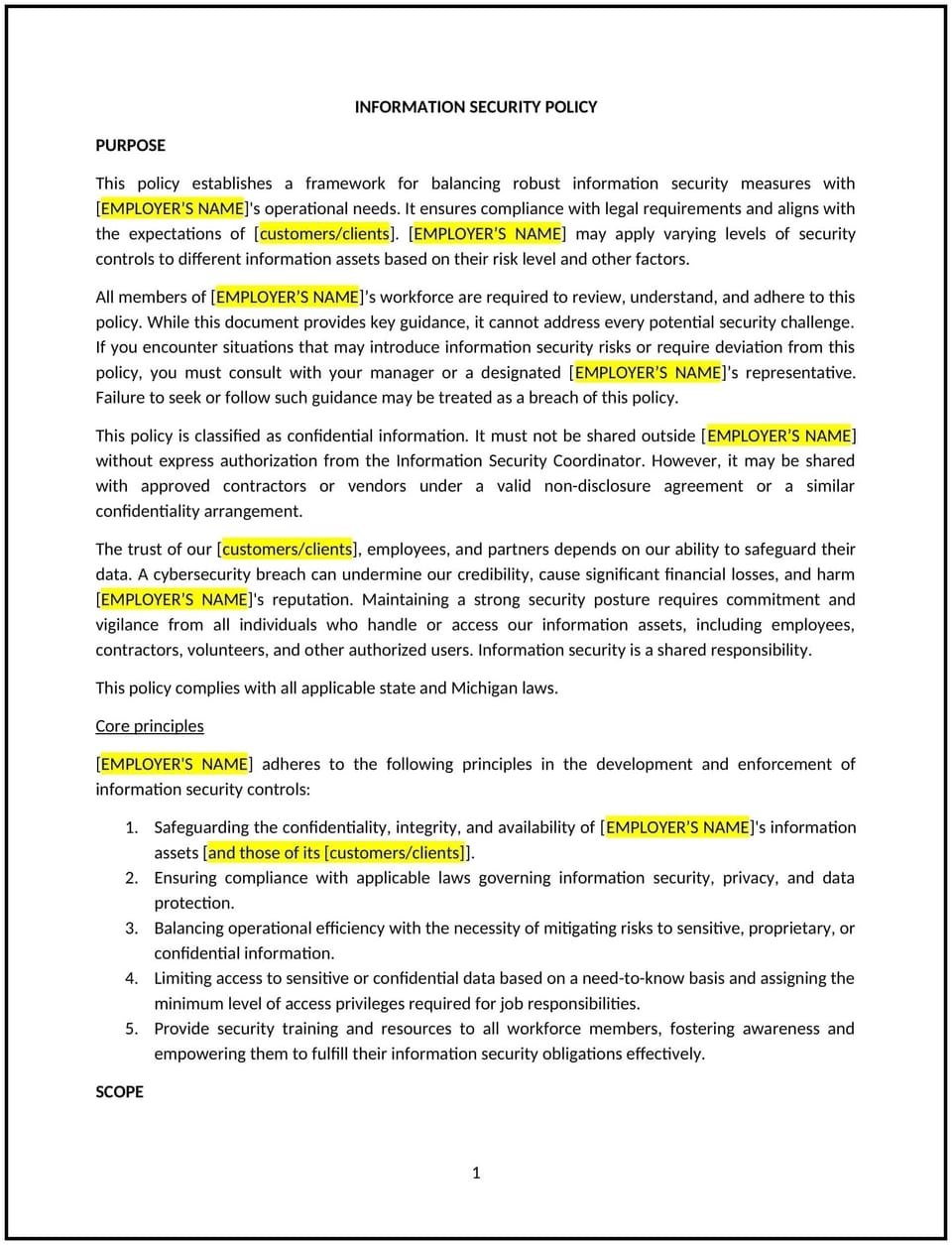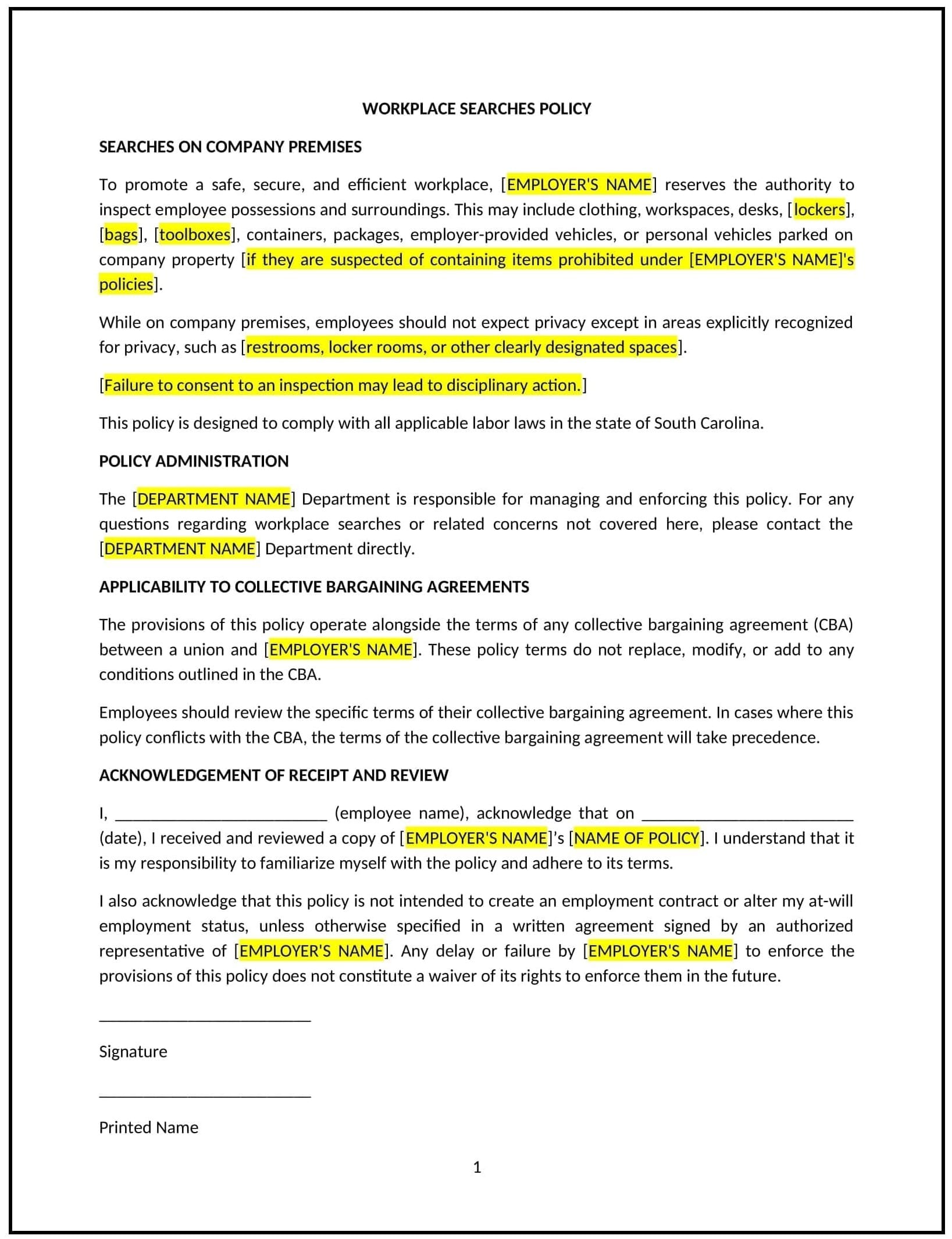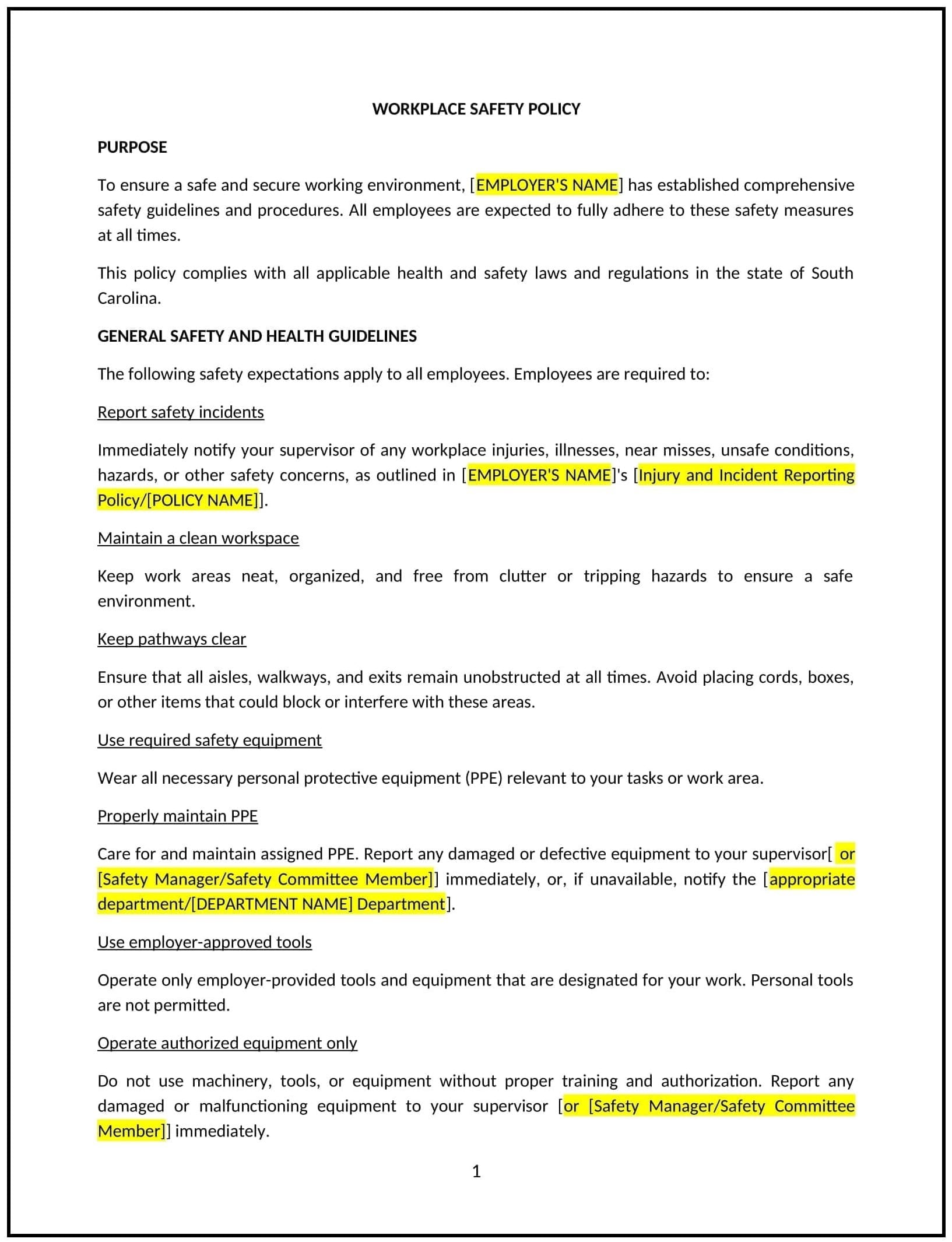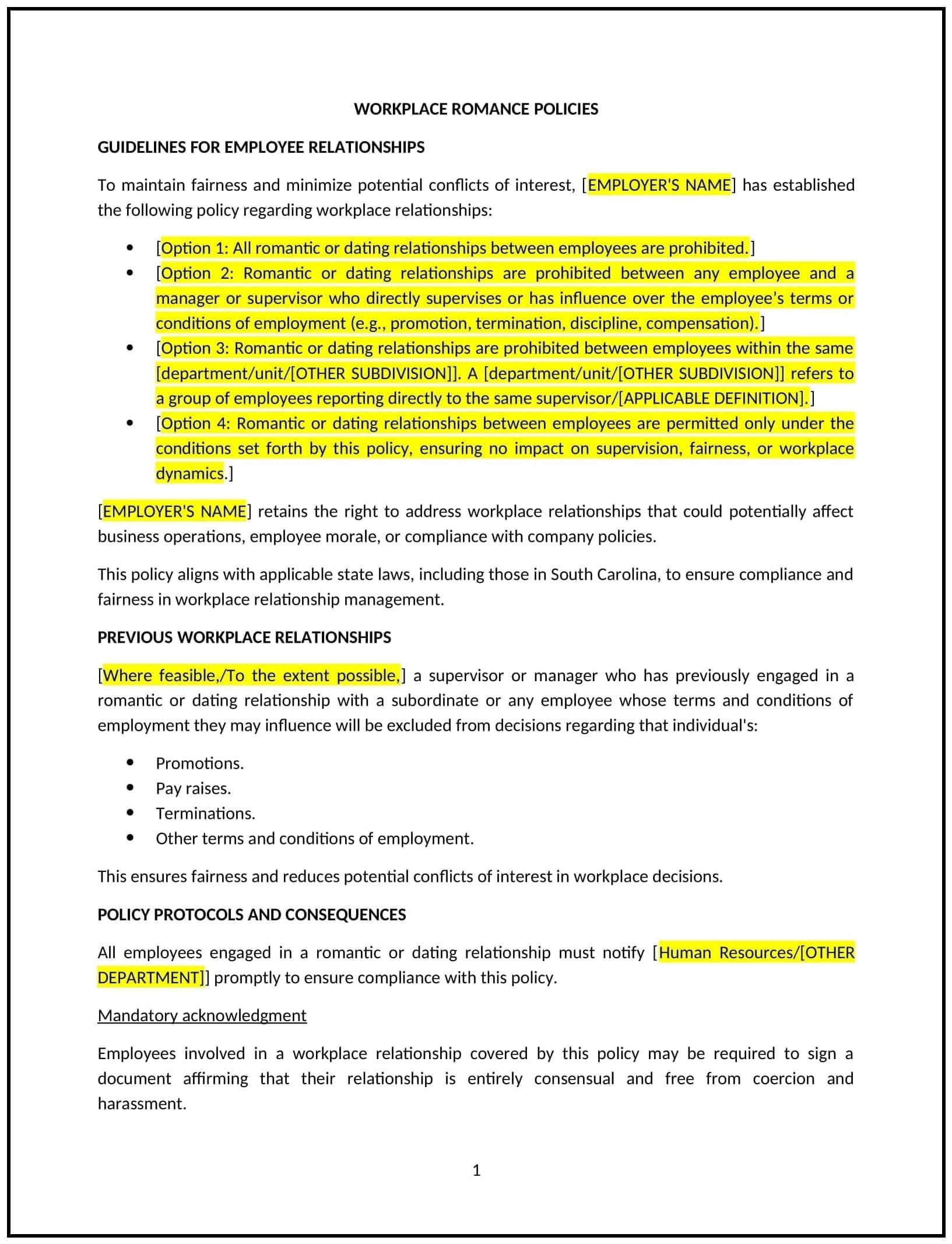Information security policy (Michigan): Free template

Information security policy (Michigan)
An information security policy outlines the measures that Michigan businesses must take to protect sensitive data and maintain the integrity, confidentiality, and availability of information across their systems and networks. This policy establishes guidelines for safeguarding business and customer data from unauthorized access, theft, loss, or corruption, in compliance with Michigan state laws and federal data protection regulations.
By adopting this policy, businesses can minimize the risk of data breaches, build trust with customers, and ensure compliance with information security standards.
How to use this information security policy (Michigan)
- Define sensitive information: Identify and classify the types of sensitive information that need protection, such as personal identifiable information (PII), financial data, intellectual property, and proprietary business information.
- Set access control measures: Establish procedures to control who can access sensitive data, including the use of secure passwords, multi-factor authentication (MFA), and role-based access controls to limit access to authorized personnel only.
- Implement data encryption: Require encryption of sensitive data, both in transit and at rest, to ensure it is protected during transmission and storage.
- Outline data retention and disposal: Specify the retention period for different types of data and the procedures for securely disposing of data when it is no longer needed, such as using secure deletion methods for digital files and shredding physical documents.
- Provide security training: Ensure that all employees, contractors, and other stakeholders receive training on information security best practices, phishing prevention, safe internet practices, and how to report security incidents.
- Monitor and audit systems: Regularly monitor IT systems for unusual activity, conduct security audits, and perform vulnerability assessments to identify potential risks and vulnerabilities in the system.
- Address incident response: Establish procedures for responding to data breaches or security incidents, including how to detect, report, and mitigate the effects of security breaches, and how to notify affected parties as required by law.
- Comply with relevant laws: Ensure the policy aligns with Michigan state laws, as well as federal regulations like the General Data Protection Regulation (GDPR), the Health Insurance Portability and Accountability Act (HIPAA), or the Federal Information Security Modernization Act (FISMA), depending on the nature of the business.
- Update and review regularly: Periodically review and update the policy to reflect changes in technology, evolving security threats, and any updates to relevant laws and regulations.
Benefits of using this information security policy (Michigan)
This policy provides several key benefits for Michigan businesses:
- Reduces the risk of data breaches: By implementing strong information security measures, businesses can reduce the likelihood of data breaches, protecting sensitive information from unauthorized access.
- Enhances customer trust: A commitment to information security builds customer trust by ensuring that their personal and financial information is protected, which can increase customer loyalty and retention.
- Complies with legal and regulatory requirements: The policy helps businesses comply with state and federal regulations regarding data protection, minimizing the risk of legal consequences, fines, and penalties.
- Protects intellectual property: Ensuring the security of proprietary business data and intellectual property protects a business's competitive edge and financial interests.
- Improves overall business resilience: A robust information security policy contributes to the overall resilience of the business by safeguarding critical data and enabling the business to quickly recover from any potential data loss or cyber incidents.
Tips for using this information security policy (Michigan)
- Communicate the policy: Ensure that all employees, contractors, and third-party vendors are aware of the information security policy by including it in the employee handbook, during onboarding, and through regular training sessions.
- Regularly update security practices: Technology and security threats evolve rapidly. Regularly review and update the information security practices to stay ahead of emerging risks and ensure the business remains secure.
- Implement robust monitoring systems: Use automated systems to monitor network activity, detect security incidents, and alert personnel about potential breaches or vulnerabilities.
- Involve senior management: Ensure that senior management is actively involved in setting the tone for security culture, making decisions on security budgets, and supporting security initiatives.
- Offer continuous education: Provide ongoing training for employees to keep them up to date on the latest information security practices, phishing tactics, and how to identify potential security risks.
Q: What types of information need to be protected under the policy?
A: Sensitive information includes personal identifiable information (PII), financial data, intellectual property, confidential business data, and any other information that could harm the business or individuals if compromised.
Q: How can businesses secure sensitive data?
A: Businesses can secure sensitive data by using strong access controls, encrypting data in transit and at rest, implementing multi-factor authentication, and regularly auditing systems for vulnerabilities.
Q: How should businesses handle data breaches or security incidents?
A: In the event of a data breach or security incident, businesses should have a defined response plan that includes identifying the breach, containing the damage, notifying affected parties, and reporting the incident to relevant authorities if necessary.
Q: What is the role of employees in information security?
A: Employees are responsible for following the company's security protocols, such as using strong passwords, avoiding phishing scams, and reporting any suspicious activity or security breaches promptly.
Q: What should businesses do if they are using third-party vendors that have access to sensitive data?
A: Businesses should ensure that third-party vendors comply with the company’s information security policies and conduct regular audits to ensure they meet security standards. Contracts should include provisions for data protection and breach notification.
Q: How often should businesses review their information security policy?
A: Businesses should review their information security policy at least annually or whenever there are significant changes in technology, business operations, or regulatory requirements.
Q: What are the consequences if employees fail to follow the information security policy?
A: Employees who fail to follow the information security policy may face disciplinary action, including retraining, suspension, or termination, depending on the severity of the violation.
Q: How can businesses ensure compliance with federal data protection regulations?
A: Businesses should stay updated on relevant federal data protection laws (e.g., GDPR, HIPAA) and integrate compliance requirements into their information security policy and practices.
This article contains general legal information and does not contain legal advice. Cobrief is not a law firm or a substitute for an attorney or law firm. The law is complex and changes often. For legal advice, please ask a lawyer.


